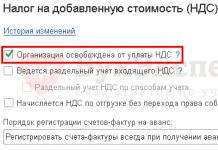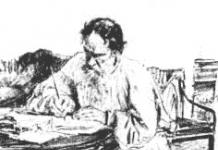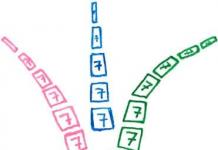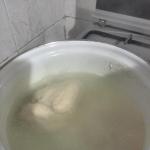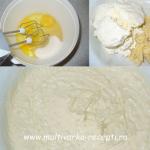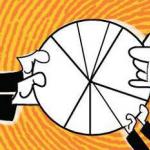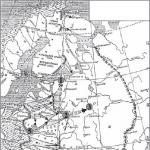Colon in a non-union complex sentence it is placed in cases where the main part of the statement is in the first part of the complex sentence, and the second part contains an explanation, reveals contents of the first part or is there an indication of reason.
A colon in a non-union complex sentence is placed:
1. If the second part of the sentence reveals contents of the first part(in such cases, the words “namely” can be substituted between parts of a non-union complex sentence).
FOR EXAMPLE: The fateful moment was approaching: the flight was heading towards the open gates of the palace(Olesha). And then there’s another concern: it’s leaking through the roof, dripping from the ceiling(Bunin). I betrayed everything: I traded the sacred noise of the oak forest for a noisy circle of friends(Khodasevich).
2. If the second part indicates the basis or reason for what is said in the first part (in this case, substitution of conjunctions is possible since, because).
FOR EXAMPLE: I looked into the fire and was afraid to raise my head: it seemed that someone was looking at me from the darkness(Koval). 3. If the first part of a non-conjunctive complex sentence contains verbs see, watch, hear, know, understand, feel etc. (in this case, a conjunction that can be inserted between the parts of the sentence).
FOR EXAMPLE: With anxiety, I jumped out of the wagon and saw: my mother was meeting me on the porch with an appearance of deep grief.(Pushkin). I felt: all my blood rushed into my face(Pushkin). I also remember: she loved to dress well and spray herself with perfume.(Chekhov).
4. If in the first part there are verbs look out, look around, raise (eyes, head), listen, etc., warning about further presentation (between the parts of the sentence you can insert the words and saw (and heard, and felt): I looked out of the wagon: everything was darkness and whirlwind(Pushkin). I turn around: Grushnitsky!(Lermontov). Varvara listened: the sound of the evening train could be heard(Chekhov). I looked up: a girl was standing on the roof of my hut.(Lermontov). Polkan looked: Svetlana’s eyes were clear, her hands smelled of grass and flowers(Gaidar).
If the first part of a non-union complex sentence contains the words so, such, such, one, etc., the specific content of which is revealed in the second part: My custom is this: signed - off your shoulders(Griboyedov). Like all Moscow priests, your father is like this: he would like a son-in-law with stars and ranks(Griboyedov). One thing was certain: he would not come back.(Turgenev).
ATTENTION!
1. A colon is placed before a direct question included in a non-union complex sentence: There’s only one thing I don’t understand: how could she bite you?(Chekhov). Polkan sniffed suspiciously: didn’t the cunning boys smell like carrots from collective farm gardens?(Gaidar).
2. A colon is required in complex sentences in which the second part, explaining and revealing the meaning of the first, is a complex sentence: Only later did I understand: in order to get to work without being late, I would have to give up my car and take the metro.
3. In a non-union complex sentence, when indicating an explanation, reason, justification, it is permissible to use a dash instead of a colon (especially in fiction and journalism): We didn't like the neighbor's cat - she always sat on our fence and hunted gullible birds.
L.A. AKSENOVA,
With. Blunts,
Chaplyginsky district,
Lipetsk region
Continuation. See No. 19/2004
Punctuation marks in a non-union complex sentence
Didactic material
10th–11th grades
IV. Training exercises (continued)
Task 16. Observe the intonation of sentences in groups 1 and 2. Determine the meanings of these non-union complex sentences, explain the use of commas and semicolons in them. What is the role of the comma and semicolon in these sentences?
1st group
1. It was September, a high wind was blowing, waves were jumping angrily along the gray river, the wind, furiously tearing off their crests, sprinkled the river with cold rain. (M. Gorky)
2. A gray autumn day is approaching evening, a spruce forest stands quietly on a hillock, the wind does not stir, and the leaves of young mountain ash and birch trees spread along the slope of a compressed field can be seen far away all around... (M. Nesterov)
2nd group
1. The sun was setting; its last rays scattered in wide crimson stripes; golden clouds spread across the sky smaller and smaller, like a washed, combed wave... (I. Turgenev)
2. The night smelled heavy and damp on my hot face; it seemed that a thunderstorm was brewing; black clouds grew and crawled across the sky, apparently changing their smoky outlines. (I. Turgenev)
Prepare an expressive reading of sentences of the 1st and 2nd groups, watch the intonation: lower your voice at the end of each simple sentence and raise it at the beginning of the next one; where there is a semicolon, take long pauses.
Choose from the proposals material for different types of analysis. Parse it.
Which word in the second sentence of the 2nd group is not a member of the sentence? What is this word?
Describe today using non-conjunct compound sentences, first with a comma, then with a semicolon. Read it. Will the intonation of these sentences be the same?
Exercise 17.
Read the texts. What punctuation marks should be placed between parts of non-union complex sentences in the first and second texts? Why?
Write down the texts, restoring the punctuation of sentences.
1) On Shishkin’s canvases, dark pine trees rustle dully, carved leaves rustle, transparent oak trees ring subtly. In his drawings, elastic branches intertwine, prickly needles puff up, leaves grow. (V. Porudominsky)
2) For about two weeks there was a drought; a thin fog filled the air with milk and covered the distant forests; it smelled of burning. Many dark clouds with vaguely outlined edges crawled across the pale blue sky; a rather strong wind rushed in a dry, continuous stream without dispersing the heat. (I. Turgenev)
(In the first text, a comma is placed between parts of non-conjunct complex sentences; in the second text, parts of complex non-conjunctive sentences are separated by a dot and a busy one.)
Prepare to read texts expressively. Indicate the features of intonation of sentences in the first and second texts.
What do you think: why are complex non-conjunctive sentences with the meaning of simultaneity of actions (imperfective verbs) so often used in descriptions?
What do you know about the artist I.I. Shishkin? What paintings of this master of brushes do you know?
Look at the reproduction of the painting by I.I. Shishkina "Rye". Try to describe the picture using complex non-conjunctive sentences.
Task 18. Read the sentences using correct intonation. Write down, restoring punctuation (commas and semicolons) between parts of complex non-conjunct sentences; add other punctuation marks. Explain your choice.
1) Courage is a great quality of the soul; a people marked by it should be proud of themselves. (N. Karamzin) 2) Philistinism a great evil, like a dam in a river, it has always served only for stagnation. (A. Chekhov) 3) A person is caught in small things in large things, you can pretend a small thing always reveals the true “essence of the soul”; its drawing gravity... (M. Gorky) 4) Philistinism a creeping plant, it is capable of endlessly multiplying and would like to strangle with its shoots everything in its path. (M. Gorky) 5) It was a harsh January morning, fine dry snow was falling from the low-lying cloudy sky, driven by gusts of wind, it pricked my face like needles and ran away in waves along the frozen road. (D. Grigorovich) 6) This is the crystal transparent soul of such people, they are few and far between pearls in crowd! His nothing can bribe your heart you can rely on him anywhere and everywhere. (I. Goncharov) 7) Only true scientists continue to study; the rest prefer to teach. (B.Shaw)
– Check your work, analyze the punctuation:
1) Courage is a great quality of the soul; the people marked by it should be proud of themselves. (N. Karamzin) 2) Philistinism is a great evil; it, like a dam in a river, has always served only
for stagnation. (A. Chekhov) 3) A person gets caught in the little things, but in the big things you can pretend, the little things always reveal the true “essence of the soul”, its pattern, its gravity... ( M. Gorky) 4) Philistinism is a creeping plant, it is capable of endlessly multiplying and would like to strangle everything in its path with its shoots. (M. Gorky) 5) It was a harsh January morning; fine dry snow fell from the low-lying cloudy sky; driven by gusts of wind, he pricked his face like needles and ran away in waves along the frozen road. (D. Grigorovich) 6) This is a crystal, transparent soul; there are few such people; they are rare; These are pearls in the crowd! Nothing can bribe his heart; you can rely on him anywhere and everywhere. (I. Goncharov) 7) Only true scientists continue to study; the rest prefer to teach. (B.Shaw)
Task 19. 1) How are punctuation marks determined in non-union complex sentences?(The meaning of non-union complex sentences.)
2) Remember and list the main meanings of non-union complex sentences.(Meanings of enumeration; meanings of cause, explanation, addition; meanings of opposition, time, condition, consequence, conclusion.)
3) Look at the diagrams and remember the conjunctions that can be used to check the meanings of non-union complex sentences; Label the “test” conjunctions at the top of each diagram.
Non-union complex sentence
Task 20. Write down the sentences, placing punctuation marks, next to each other, where possible, write the appropriate version of the complex sentence.
 1) Education is a great thing; it decides the fate of a person. (V. Belinsky) 2) The weirdo had one peculiarity: something always happened to him. (V. Shukshin) 3) The moon glows dimly in the twilight of the fog, dear Svetlana is silent and sad. (V. Zhukovsky) 4) Art performs the work of memory; it selects from the flow of time the most vivid, exciting and significant and imprints it in the crystals of books. (L. Tolstoy) 5) Never give free rein to your imagination; it will produce monsters. (Pythagoras) 6) A shot rang out and the wolf continued to run.
1) Education is a great thing; it decides the fate of a person. (V. Belinsky) 2) The weirdo had one peculiarity: something always happened to him. (V. Shukshin) 3) The moon glows dimly in the twilight of the fog, dear Svetlana is silent and sad. (V. Zhukovsky) 4) Art performs the work of memory; it selects from the flow of time the most vivid, exciting and significant and imprints it in the crystals of books. (L. Tolstoy) 5) Never give free rein to your imagination; it will produce monsters. (Pythagoras) 6) A shot rang out and the wolf continued to run.
Compare non-conjunctive complex sentences and synonymous complex sentences. Can you see how the intonation of sentences changes? Which sentences are more expressive: non-union complex or complex sentences?
Write down sentence 6. Replace this non-union complex sentence with synonymous sentences so that it turns out: a) complex; b) a simple sentence. Add the necessary words if necessary. For example:
l) September has arrived and the children have gone to school.. 2) September came and the children went to school. 3) In September the children went to school.
Draw a conclusion about the expressive capabilities of complex non-union sentences.
Task 21. Non-union enhances the expressiveness of the phrase. Non-union complex sentences are characterized by emotional tension and dynamism; liveliness, lightness, simplicity, grace, expression. Often non-union complex sentences are found in proverbs, sayings, fairy tales, and aphorisms.
Read the sentences. What semantic relationships are implied (indicated by intonation) in non-union complex constructions? Write it down using punctuation marks; Emphasize the grammatical basics of sentences.
 1) Don’t chase happiness; it is always within you. (Pythagoras) 2) There is no shame in learning and in adulthood it is better to learn late than never. (Aesop) 3) If you don’t have a smart neighbor, talk to a book. (Proverb) 4) The world is pitiful only for a pitiful person; the world is empty only for an empty person. (L. Feuerbach) 5) Be the master of yourself, reigning and governing yourself well, you will have excellent dominion and the most important position. (Pythagoras) 6) If you want to study yourself, look at people and their deeds. If you want to study people's hearts, look into yours. (F. Schiller) 7) Don’t be surprised at anything; the gods were surprised. (Pythagoras) 8) By listening and remaining silent you will become wise. The beginning of wisdom is silence. (Pythagoras) 9) The service of the muses does not tolerate vanity; beauty must be majestic. (A. Pushkin) 10) First of all, learn to call every thing by its name; this is the very first and most important of all sciences. (Pythagoras) 11) Peaks are not reached immediately; skill is acquired gradually. (Latin saying) 12) Cultivate your field with your own hands, do not leave it to your slaves to cultivate; agriculture necessarily requires the hands of a free person. (Pythagoras) 13) Don’t make fun of those who are ridiculed; you will make enemies in them. (Cleobulus) 14) Life is like a theater in which very bad people often occupy the best places. (Pythagoras) 15) Do not punish a drunken slave; he will appear drunk. (Cleobulus) 16) Refrain from drinking wine; it is milk that feeds passions. (Pythagoras) 17) Do not proclaim the truth in public places; the people will use it for evil. (Pythagoras) 18) An educated person is modest, a deep river is calm. (Mongolian proverb)
1) Don’t chase happiness; it is always within you. (Pythagoras) 2) There is no shame in learning and in adulthood it is better to learn late than never. (Aesop) 3) If you don’t have a smart neighbor, talk to a book. (Proverb) 4) The world is pitiful only for a pitiful person; the world is empty only for an empty person. (L. Feuerbach) 5) Be the master of yourself, reigning and governing yourself well, you will have excellent dominion and the most important position. (Pythagoras) 6) If you want to study yourself, look at people and their deeds. If you want to study people's hearts, look into yours. (F. Schiller) 7) Don’t be surprised at anything; the gods were surprised. (Pythagoras) 8) By listening and remaining silent you will become wise. The beginning of wisdom is silence. (Pythagoras) 9) The service of the muses does not tolerate vanity; beauty must be majestic. (A. Pushkin) 10) First of all, learn to call every thing by its name; this is the very first and most important of all sciences. (Pythagoras) 11) Peaks are not reached immediately; skill is acquired gradually. (Latin saying) 12) Cultivate your field with your own hands, do not leave it to your slaves to cultivate; agriculture necessarily requires the hands of a free person. (Pythagoras) 13) Don’t make fun of those who are ridiculed; you will make enemies in them. (Cleobulus) 14) Life is like a theater in which very bad people often occupy the best places. (Pythagoras) 15) Do not punish a drunken slave; he will appear drunk. (Cleobulus) 16) Refrain from drinking wine; it is milk that feeds passions. (Pythagoras) 17) Do not proclaim the truth in public places; the people will use it for evil. (Pythagoras) 18) An educated person is modest, a deep river is calm. (Mongolian proverb)
Task 22. One complex non-union sentence can combine different meanings. For example, in the sentence The crow croaked at the top of its lungs: the cheese fell out - such was the trick with it three simple sentences, between the first two sentences in this non-union complex relationship there are causal relationships, between the second and third - consequences.
Read complex non-conjunctive sentences, determine the meanings between their parts; write down using punctuation marks, emphasizing grammatical basics.
1) Someone said our heart is like an enchanted chest and evil and good lie side by side there. (G. Tsiferov) 2) Choose a friend for yourself; you cannot be happy alone; happiness is a matter of two. (Pythagoras) 3) True talents are not angry at criticism; they cannot be damaged; they cannot beauty; only fake flowers are afraid of rain. (I. Krylov) 4) Some marvelous triumphant sounds filled the air above his head; he (Lavretsky) stopped; the sounds thundered even more magnificently; they flowed in a melodious strong stream. (I. Turgenev) 5) Enough people have been fed sweets; their stomachs have spoiled because of this; they need bitter medicine and caustic truths. (M. Lermontov) 6) The weather was beautiful, white round clouds were high and quietly rushing over us, clearly reflected in the water, the reeds whispered all around the pond, in places it sparkled like steel in the sun. (I. Turgenev) 7) Meanwhile, eight hours of continuous work on the stage took its toll on the artist’s hands, his legs ached and his back ached from the long and uncomfortable seat. (A. Kuprin) 8) By evening, they (the clouds) began to disperse again, some turned pale, grew longer and ran beyond the horizon, others overhead turned into white transparent scales, only a large black cloud stopped in the east. (L. Tolstoy) 9) Having gone far away, Anna Vasilievna looked back at the white-pink oak tree in the sunset rays for the last time and saw a dark figure at its foot. Savushkin did not leave; he was guarding his teacher from afar. (Yu. Nagibin) 10) The forest is like a temple, it cleanses the soul and inspires thoughts on the high. For a good coniferous forest, you can give your favorite book. (M. Osorgin)
– Check your work:
1) Someone said: our heart is like an enchanted chest - both evil and good lie side by side. (G. Tsiferov) 2) Choose a friend; You cannot be happy alone: happiness is a matter of two. (Pythagoras) 3) True talents do not get angry because of criticism: beauty cannot damage them; Only fake flowers are afraid of rain. (I. Krylov) 4) Some wondrous, triumphant sounds filled the air above his head; he (Lavretsky) stopped: the sounds thundered even more magnificently; they flowed like a singing strong stream. (I. Turgenev) 5) Quite a few people were fed sweets; This has spoiled their stomach: they need bitter medicine, caustic truths. (M. Lermontov) 6) The weather was beautiful: white round clouds rushed high and quietly above us, clearly reflected in the water; the reeds whispered all around; The pond in places sparkled like steel in the sun. (I. Turgenev) 7) Meanwhile, eight hours of continuous work on the stage was taking its toll: the artist’s hands ached, his legs and back ached from the long and uncomfortable seat. (A. Kuprin) 8) By evening they (the clouds) began to disperse again: some turned pale, grew longer and ran beyond the horizon; others, just above the head, turned into white transparent scales; only one large black cloud stopped in the east. (L. Tolstoy) 9) Having gone far away, Anna Vasilievna looked back for the last time at the oak tree, white and pink in the sunset rays, and saw at its foot a small dark figure: Savushkin did not leave, he was guarding his teacher from afar. (Yu. Nagibin) 10) The forest is like a temple, it cleanses the soul and brings thoughts to the highest; You can trade your favorite book for a good coniferous forest. (M. Osorgin)
Draw a diagram of sentence 8, give its full punctuation characteristics, and analyze it by members.
Write out several pairs of antonyms from these sentences; identify their part of speech; sort these words according to their composition.
Write down one numeral and parse it as a part of speech.
Write down a word that has more sounds than letters.
Determine the meaning of the highlighted word.
Write out five words from these sentences with the spelling “Unpronounceable consonant at the root”, explain their spelling.
Exercise 23. Read it. Observe the punctuation marks in the text; what is their syntactic and stylistic role? Describe the expressive and stylistic possibilities of complex non-union constructions.
Everything physically 2 tends 1 downwards: water flows into the valley, vegetation 2 thickens around 1 waters, people gather 2, 6 there - crowded below, loneliness 4 above. Material concerns pull us down, spiritual interests 5 call us up, just as a person is distributed 6: at the top is the head, thought, spiritual aspirations, below is the stomach, animal aspirations - this is how all of nature is built 3 in accordance with this dual 2 division of the person living in it. (S. Volkonsky)
Formulate the main idea of the text.
What other technique, besides expressive non-union, does the author use to indicate his idea more clearly? (Antonymic organization of the text.)
Write down the antonyms.
Give examples of forward and reverse word order. Why do you think reverse word order is used in this text?
Explain the spelling of adverbs in the text.
Perform the designated types of analysis.
Match words with the same root loneliness, living.
Task 24. Non-union is often used in poetic speech. Read it. Describe the expressive role of non-union. Draw sentence diagrams. What semantic relationships are implied in these non-union complex sentences (indicate this in the diagrams)?
1) I erected a monument to myself, not made by hands,
The people's path to him will not be overgrown,
He ascended higher with his rebellious head
Alexandrian Pillar.2) You can’t understand Russia with your mind,
The general arshin cannot be measured:
She will become special -
You can only believe in Russia.3) Birds are flying from afar again
To the shores that melt the ice.
The warm sun goes high
And the fragrant lily of the valley awaits.4) In a foreign land I religiously observe
Native custom of antiquity:
I'm releasing the bird into the wild
On the bright holiday of spring.5) Oh Rus'! Exhausted in anguish,
I compose hymns for you,
There is no sweeter land in the world,
O my Motherland!6) The sun laughs less often,
There is no incense in the flowers,
Autumn will wake up soon
And he will cry sleepily.7) Silence descends on the yellow fields,
In the cooled air from the fading villages,
Trembling, ringing...8) It's a sad time! charm of the eyes!
I am pleased with your farewell beauty -
I love the lush decay of nature,
Forests dressed in scarlet and gold.
(Reference: A. Fet; I. Bunin; A. Pushkin; K. Balmont; F. Tyutchev; F. Sologub; A.K. Tolstoy.)
Prepare expressive readings of poetry passages.
Underline the grammatical basics in texts 5, 6; indicate how they are expressed.
Indicate the type of simple sentences in texts 2, 4 .
Write down sentences with addresses, explain the punctuation with them. What is the role of appeals in these texts?
What sentences contain a participial phrase, a participial phrase and a solitary participle? Explain the punctuation marks in them; Underline the isolated members as parts of the sentence, highlight the defined words in a frame. In which sentence is the participial phrase not isolated? Why?
Indicate a non-union complex sentence that combines different meanings between parts.
Write down obsolete words and forms of words, write down the corresponding words of the modern Russian language next to them.
Task 25. Read the poem carefully, try to feel the mood that it conveys.
I'm waiting, filled with anxiety,
I'm waiting here on the way:
This path through the garden
You promised to come.
While crying, the mosquito will sing,
The leaf will fall smoothly...
The rumor, opening up, grows,
Like a midnight flower.It's like I broke a string
A beetle flew into a spruce;
Hoarsely he called his friend
There is a corncrake right there at your feet.Quiet under the forest canopy
Young bushes are sleeping...
Oh, how it smelled like spring!..
It's probably you!
Tell us about the mood, emotions, impressions that this poem evokes in you.
Name the means of expression that the poet uses.
Find repeated stress sounds in the text. What sound images do these repetitions create? (If you create a kind of short “sound map” of the poem, you can observe the following:
U O A |
A A O |
O U A |
I E O |
As we see, in the first stanza the stressed sound [u] is repeated (and in the first two lines there are four (!) sounds [u]), which, according to M. Lomonosov, is capable, together with the sounds [o], [s] of depicting “strong things: anger, envy, illness and sadness"; in this case, the repetition of vowels [у], [о] enhances the lyrical hero’s anxiety, mystery, enigma; and only the “gentle” sounds [e], [i] outlined here will be repeated often in the last two stanzas, encouraging the lyrical hero.
Sound [a], but in the opinion of M. Lomonosov, contributes to “the image of the splendor of great space, depth and height, also sudden.” The repetition of the stressed [a] in the first stanza and the abundance of this sound in the second stanza in the “neighborhood” with the repeated [o] enhances the expressiveness of the poem, emphasizes the breadth of view and soul of the lyrical hero, a certain calmness and tranquility, mystery.
This state is replaced by excitement, tension, anxiety and sadness in the third stanza with the help of repetition [y].
And in the last quatrain there is an abundance of different repeating sounds - broad, mysterious, enigmatic [a], [o]; “strong”, sad [s] and “tender”, joyful [e] – emphasizes the boundlessness, vastness, openness of the poet’s soul, aspiration towards peace, spring, love.)
The repetition of which consonant sounds (especially in the second and fourth quatrains) enhances the expressiveness of the poem? What is this technique called? (Alliteration.) What is his role? What sound patterns are created by repeated consonants?
Re-read this poem again. What other techniques, expressive means that help the author convey his feelings, emotions, mood, have you been able to discover at the moment?
What gives the description a lively, dynamic character?
How do non-conjunctive complex sentences enrich the expressiveness and content of a poem?
Determine the meanings outlined by intonation in these non-union complex constructions and the function of punctuation marks. What conjunctions can be used to check the meanings and punctuation between parts of non-union complex sentences?
What is the emotional content of the ellipsis, exclamation marks and combination of characters (penultimate sentence) in this poem?
What's happened Maybe in the last sentence? What is the role of this word in the poem?
Give examples of forward and reverse word order. Why do you think reverse word order is used in the poem?
Write this poem down from memory. In non-conjunctive complex sentences, underline the grammatical basics and indicate how they are expressed.
Task 26. Prepare for expressive reading. Pause. Indicate the words that you will especially emphasize as you read. In what places will you read with a decrease in intonation, and where - increasing the sound of a word, sound, phrase?
|
I don't want your love Your soul is always full Do you forgive your enemies - |
Only temporarily do I seem weak, It's not your love that I need, Love doesn't come to mind: (K. Ryleev. K N.N.) |
Think: what is Kondraty Ryleev’s poem about and in what lines is his main idea contained?
What techniques and means of expression help the author convey his emotions, feelings, and mood more clearly and more fully?
What syntactic means of expressive speech are used by the author?
How can one explain the abundance of non-union complex sentences in this poem? What does the author achieve with this choice? Describe the visual and expressive capabilities of complex non-union constructions and their role in the poem.
What semantic relationships are implied between the parts of non-union complex sentences in Ryleev’s poem? Explain the function of each punctuation mark.
Write down a poem; in non-union complex sentences, emphasize the grammatical basics, indicate how they are expressed; draw diagrams.
Perform a complete syntactic analysis of the sentence in the third stanza.
Identify the parts of speech in the last sentence of the poem.
One of the features of the poem is the repetition of some words. Find lines with repeated words. Try to explain the role of this poetic artistic device in each case.
Write out cases of inversion from the poem, and indicate their grammatical form in brackets. For example: the waves are playing(predicate – subject). Think: what effect does the poet achieve by turning to inversion in a poem?
Find a word in the poem whose pronunciation differs from the orthoepic norms of the modern Russian language. Explain why this is happening.
Explain the meaning and stylistic affiliation of the following words: alien, vengeance, others, gratifying, doesn't come to mind suffers, sim, thirsts. Are these words used in modern Russian? What are word combinations like the one highlighted here called? What is the role of this vocabulary in K. Ryleev’s poem?
Task 27. Prepare an expressive reading of Alexei Koltsov’s poem “Russian Song”.

The poetics of Alexei Koltsov are close to folk songs. Note what traditional techniques for oral folk art in this poem indicate its closeness to works of folklore. (In this poem by A. Koltsov, one can note such techniques characteristic of oral folk art as repetitions (particles Not in the first two lines, prepositions under in the third stanza, words nights, blizzards, dreams), epithets (dreams magical, edge enchanted, nights stormy etc.), comparisons (nights... passed, like clouds), personification, parallelism, words with diminutive suffixes (clouds, sunshine), inversion (winter blizzards, dark nights), words with final -xia (turned green, showed off, admired); melodiousness.)
Analyze the punctuation of the poem. Explain the choice and use of each punctuation mark.
Find all non-union complex sentences, observe how they are constructed, what artistic techniques, means of expression can be noted in their composition; what punctuation marks separate their parts. Draw a conclusion about the role of complex non-union constructions in this poem.
Write down Koltsov's poem in a notebook, underline the grammatical basics in non-union complex sentences, indicate how they are expressed. Draw diagrams of non-union complex sentences, determine the meanings between their parts (indicate “test” conjunctions in the diagrams).
Write a short creative work “The role of non-union complex sentences in poetic texts.”
Task 28. Read expressively the poems of S. Nadson and I. Surikov.
|
In a green grove, above a quiet river White midnight is quiet and clear, Wonderful song! Listen to her: (S. Nadson) |
The sun is shining brightly, (I. Surikov) |
Choose the poem that, in your opinion, most clearly illustrates the theme “Conjunctionless Complex Sentences.” Prepare questions and tasks for analyzing this poetic text.
To be continued
EXERCISE 1Highlight parts of the BSP, emphasize the grammatical basics:
1) The night was black and starry; the road turned black between the white snow that had fallen the day before, on the day of the battle. (L.T.)
2) At the turn of the Danube, ships, an island, and a castle with a park, surrounded by the waters of the confluence of the Ensa and the Danube, were visible; the left rocky bank of the Danube, covered with a pine forest, was visible with the mysterious distance of green peaks and blue gorges. (L.T.)
3) Not far from the shore stood four tarred ships, their high stern parts, decorated with carved wood, with square windows, were reflected in the greenish water. (A.T.)
4) I looked carefully: all the faces around me expressed tense anticipation. (I.T.)
TASK 2Place commas in BSP. Please indicate the number of parts:
1) On two moved benches on twenty-seven sheaves of rye on seven feather beds there was a silk bed with many pillows in pearl pillowcases and a fur hat on top of them. (A.T.)______________________________
TEST 2. BSP with enumeration value
Last name, first name ____________________ class _____ date __________
EXERCISE 1Add missing punctuation marks. Highlight parts of complex sentences and emphasize grammatical basics.
1) There, pavements made of golden tiles sparkled with unbearable brilliance, bizarre domes and towers with purple roofs rose, diamonds sparkled in the windows, bright multi-colored flags fluttered in the air. (A.K.)
TASK 2Indicate the correct explanation of the punctograms:
A mile from Medvedkov, a man waving (1), seeing a carriage (2), waved his hat (3), at the edge of a birch grove, a second one responded (4), on a hillock behind a ravine (5), a third. (A.T.)
A – 1, 2 – isolation of the definition expressed by adverb. about.
B – 1, 2 – isolation of a circumstance expressed by an adverbial phrase
B – 3 – comma between parts of the BSP with the enumeration value
G – 3 – semicolon between parts of the BSP with the enumeration value, since the first part has its own signs
D – 4 – comma between parts of the BSP with the enumeration value
E – 4 – comma between homogeneous members of the sentence
F – 5 – dash between subject and predicate
3 – 5 – dash in an incomplete sentence
And – 5 – dash in BSP with the meaning of opposition
TEST 3. BSP with the meaning of the reason, explanation, addition
Last name, first name ____________________ class _____ date __________
EXERCISE 11) Oblomov turned around: there were two children in the yard, a boy and a girl, looking at him with curiosity. (I.G. )
2) Soon he got tired of the evenings: he had to put on a tailcoat and shave every day. (I.G.) ______________________________
3) We looked at each other: we were struck by the same suspicion... (M.L.) ______________________________
4) I didn’t know where to go: sheep were bleating here, a dog was grumbling there. (M.L.) ______________________________
5) The assistant clerk lived on a large scale: there was a lantern on the stairs, the apartment was on the second floor. (N.G.) ______________________________
6) The young student boiled over: with insane courage, he grabbed the rear wheel with his powerful hand and stopped the car. (N.G.) ______________________________
TASK 2Varvara listened and heard the sound of an evening train approaching the station. (A.Ch.)
A – BSP with an enumeration value, a semicolon is used, since the second part has a separate definition
G – a dash is placed in the BSP, so the first part indicates the time
TEST 4. BSP with the meaning of opposition, time, condition, consequence
Last name, first name ____________________ class _____ date __________
EXERCISE 1Select the parts of the BSP, indicate the relationships between them:
1) You know, your heart started beating - your whole face suddenly flushed. (N.N.) ______________________________
3) I ordered the money for the rams to be placed next to him - he did not touch them, he lay on his face as if dead. (M.L.) ______________________________
4) He didn’t like such an idle life - he wanted real work. (N.G.) ______________________________
TASK 2Indicate the correct options for explaining the punctograms:
You can't understand Russia with your mind,(F. Tyutchev)
A common arshin cannot be measured (1)
She has become special (2)
You can only believe in Russia.
b) colon. between parts of the BSP, 2 hours decree. for the reason
c) a dash between the parts of the BSP, 2 hours, decree. for investigation
a) a comma between parts of the BSP with the enumeration value
b) colon between parts of the BSP, 2 parts decree. for the reason
TEST 5. Punctuation marks in BSP
Last name, first name ____________________ class _____ date __________
EXERCISE 1Insert the missing punctuation marks in the BSP:
1) But Oblomov was right in fact, not a single stain, the reproach of cold, soulless cynicism, without passion and without struggle, lay on his conscience. (I.G.)
2) Wonderful day! Centuries will pass in the same way, in an eternal order, the river will flow and sparkle and the fields will breathe in the heat. (F.T.)
3) If you like the proverb, write the proverb! (N.N.)
4) It is not the wild winds that blow, it is not mother earth that sways, that makes noise, sings, swears, sways, rolls around, fights and kisses at the holiday people! (N.N.)
5) There was a special kind of strangeness about Foma Grigorievich; he loved to tell the same thing to death. (N.G)
6) Mossy trunks of fallen trees, holes, tall ferns, rose hips, jasmine and hazel trees interfered with her at every step, overcoming them, she gradually lost strength... (A.G)
TASK 2Indicate the correct explanation of the punctogram:
For three days and three nights Moscow raged - flocks of crows above it flew high from the sound of alarm bells. (A.T.)
A – BSP with an enumeration value, a semicolon is used, since the parts are distant from each other in meaning
B – BSP with the enumeration value, a comma is placed C – a colon is placed in the BSP, since the second part complements the content of the first
G – a dash is placed in the BSP, since the first part indicates the time
TEST 6. Punctuation marks in BSP
Last name, first name ____________________ class _____ date __________ date
EXERCISE 1In which sentences should a colon be placed at the place of the blank in the BSP?
1) You will never see her at work - bending over, sewing, doing small things does not suit her face, an important figure. (I.G.)
2) The passer-by made a movement to raise his head, but could not _ he was apparently unwell or very tired. (I.G)
3) I ask you one thing - shoot quickly. (M.L.)
4) But as soon as I woke up, the dream disappears... (M.L.)
5) I stood up and looked out the window - someone ran past him a second time and disappeared God knows where. (M.L.)
6) It’s high time everyone went their own way - they’re walking side by side! (N.N.)
7) Centuries passed _ everything strived for happiness... (N.N.)
TASK 2In which sentences is there a semicolon between parts of the BSP?
1) The sun had already hidden in a black cloud resting on the ridge of the western mountains - it became dark and damp in the gorge. (M.L.)
2) Finally we parted - I followed her with my gaze for a long time until her hat disappeared behind the bushes and rocks. (M.L.)
3) The village on the other side of the pond was already asleep - not a single light was visible. (A.Ch.)
TEST 7. Punctuation marks in BSP
Last name, first name ____________________ class _____ date __________
EXERCISE 1In which sentences should a dash be placed between parts of the BSP?
1) Olga’s relationship with her aunt was still very simple and calm - in tenderness they never crossed the boundaries of moderation, there was never a shadow of displeasure between them. (I.G.)
2) I tried to walk - my legs gave way... (M.L.)
3) Today I got up late; I come to the well - no one is there anymore. (M.L.)
4) I want to push her away from me - she grabbed my clothes like a cat... (M.L.)
5) Only Pechorin was not the only one admiring the pretty princess - from the corner of the room two other eyes, motionless, fiery, looked at her. (M.L.)
6) These students constituted a completely separate world - they were not allowed into the upper circle, consisting of Polish and Russian nobles. (N.G.)
TASK 2Please indicate the correct punctuation:
He is constantly on the move (1) society needs to send an agent to Belgium or England (2) they send him (3) they need to write some project or adapt a new idea to business (4) they choose him. (I.G)
TEST 8. Parsing BSP
Last name, first name ____________________ class _____ date __________
EXERCISE 1Parse the sentence:
Taras was one of the indigenous, old colonels: he was all about scolding anxiety and was distinguished by the brutal directness of his character. (N.G.)
TASK 2Parse the sentence: Everything fell off on the girl: her dark hair fell off, her dress and the folds of her dress fell off; even the grass near her body seemed to fall asleep out of sympathy. (A.G.)
TASK 3Place punctuation marks and create a sentence outline:
There is a calm river in my country(N. Gumilev)
There is a lot of sweet food in the fields and groves
There the stork catches snakes from the reeds
And at noon they are drunk with the smell of gum
Red bears are tumbling.
TEST 9. Punctuation analysis of BSP
Last name, first name ____________________ class _____ date __________
EXERCISE 1Choose the correct explanation of the punctograms:
And if this continues like this (1) then I will leave myself (2) I am not his slave (3) I am a prince’s daughter. (M.L.)
a) a comma between parts of the BSP with the enumeration value
b) comma between parts of the IPP
c) comma between homogeneous members
a) a comma between parts of the BSP with the enumeration value
c) a dash between parts of the BSP, the second part indicates a consequence
a) a comma between parts of the BSP with the enumeration value
b) colon between parts of the BSP, the second part indicates the reason
c) a dash between the parts of the BSP, the parts are opposed
TASK 2Perform punctuation analysis of the sentence (the signs are not placed):
The transition from Europe to Asia becomes more sensitive hour by hour, the forests disappear, the hills are smoothed out, the grass becomes thicker. (A.P.)
TEST 10. BSP: generalization
Last name, first name ____________________ class _____ date __________
EXERCISE 1Place a comma, colon, dash or semicolon between the parts of the BSP where necessary:
1) Burmin went and the old woman crossed herself and thought maybe the matter will end today! (A.P.)
2) Gold and silver shone on their robes from lush breasts that rose like a stem, their narrow waists and diamonds shone in their ears, in their long locks and around their necks. (A.P.)
3) His glasses shone sternly, his horns of greasy hair vigorously fell in all directions, his speech flowed energetically and sharply. (I.B.)
4) And it seems to me all in music and foam, the iron world is trembling so beggarly... (O.M.)
5) The Black Sea advanced all the way to the Neva, thick as tar, its waves licked the slabs of Isaac, and crashed with mourning foam on the steps of the Senate. (O.M.)
TASK 2Fill in the missing punctuation marks in the proverbs. Mark the examples that match the diagram:
1) Bad fame will lead to no one getting married.
2) The ax promised to sink, but it was a pity that the ax handle was pulled out.
3) If you walk quietly away from trouble, you won’t walk away from trouble, you’ll run into trouble.
4) Snow will blow, bread will come, water will spill, hay will be collected.
5) The dog barks and the wind carries.
6) The fish is thin, the ear is not cooked, the fish is fat, the ear is amber.
7) To fall in love with an owl, you don’t need a bird of paradise.
$$$001. The non-union proposal is
A) Everyone in the village was surprised that the old woman was not selling her jewelry
C) If you like to ride, you also like to carry sleds
C) If I had a hundred eyes, then all a hundred would look at you
D) Vasilisa cried, and her daughter was embarrassed
E) We all remembered that our Belikov is not married
(Correct answer) =B
(Difficulty) = 3
$$$002. Non-conjunctive complex sentence with causal relations -
A) The dog poked and screamed: it pricked its nose on the thorns
C) If you’re late, blame yourself
C) The sky is cloudy, the night is cloudy
D) The blizzard is angry, the blizzard is crying, sensitive horses are snoring
E) He understood: the dog encountered something
(Correct answer) =A
(Difficulty) = 2
$$$003. Non-union sentence with relations of consequence -
A) The cheese fell out - there was a trick with it
B) Called yourself a milk mushroom - get into the back
C) Earth is like water to a fish: the shrew instantly disappeared
D) If he looks, he’ll give him a ruble
E) Looked around - there was no trace of him
(Correct answer) =A
(Difficulty) = 2
$$$004. BSP, denoting the simultaneity of occurring events -
A) When we returned home it was dark and quiet
B) Clouds are rushing, clouds are swirling
C) All the diversity, all the charm, all the beauty of life is made up of shadow and light
D) Booths, women, boys, benches and lanterns flash past
E) The crow perched on a spruce tree and was just about ready to have breakfast, but got lost in thought...
(Correct answer) =B
(Difficulty) = 2
$$$005 Number of missing punctuation marks in sentence:
The rain-washed road lined with birches seemed even more cheerful; muddy streams rushed down the slopes; a multicolored rainbow hung over the meadow; the bright sun shone on the backs of cheerfully running horses.
A. Four.
(Correct answer) =A
(Difficulty) = 3
$$$006. Complex non-union proposal -
A. Lunch hour was approaching.
B. Warm spring evening.
C. Cannonballs are rolling, bullets are whistling.
D. Come quickly.
E. Man – that sounds proud!
(Correct answer) =C
(Difficulty) = 3
$$$007.Unionless complex sentence:
A) Mowing is the most difficult and fun time.
B) Doubts, failures, misfortunes - everything is transferred personally.
C) Today was a solemn day for him - the anniversary of his coronation.
D) Reading means developing taste.
E) If you don’t love what you do, you won’t be a master.
(Correct answer)=E
(Difficulty)=2
$$$08. In the BSP there is a dash -
A) The cheese fell out and it was a trick...
B) All the way to the farm they were silent, the bumpy ride prevented talking.
C) The sky cleared, the stars began to flash, and it was already becoming light.
D) Then the thought struck him that people must be somewhere nearby.
E) I looked around solemnly and the night stood regal.
(Correct answer)=A
(Difficulty)=2
$$$009. A non-conjunctive complex sentence, between parts of which there must be a colon:
A) I’m sad, I don’t have a friend with me.
B) The Falcon flies high and huddles close to the ground.
C) The wind was blowing and the snow was falling in flakes.
D). The clouds are rushing, the clouds are swirling.
E) The cheese fell out with him, that was the trick...
(Correct answer)=A
(Difficulty)=2
$$$010.Unionless complex sentence with the meaning of reason:
A) Objects lost their shape; everything merged, first into gray, then into a dark mass.
B) The huts and courtyards were empty; everyone had gone to dig potatoes.
C) One thing has always been strange to me: I have never become a slave to the woman I love.
D) He understood that the dog encountered something dangerous.
E) The weather was terrible, the wind was howling and the snow was falling in flakes.
(Correct answer)= B
(Difficulty)=2
$$$011. Number of missing commas in a sentence:
A strong wind suddenly began to hum in the heights of the trees, large drops of rain raged, sharply knocked, splashed on the leaves, lightning flashed and a thunderstorm broke out.
(Correct answer)= E
(Difficulty)=2
$$$012. A non-union complex sentence is -
A) Everyone in the village was surprised that the old woman was not selling her jewel.
C) If you like to ride, you also like to carry sleds.
C) If I had a hundred eyes, then all a hundred would look at you.
D) Vasilisa cried, and her daughter was embarrassed.
E) We all remembered that our Belikov is not married.
(Correct answer)= B
(Difficulty)=2
$$$013. Non-conjunctive complex sentence with causal relations -
C) If you are late, blame yourself.
C) The sky is cloudy, the night is cloudy.
E) He understood: the dog found something.
(Correct answer)= A
(Difficulty)=2
$$$014. Non-conjunctive complex sentence with conditional relations -
A) The dog poked and screamed: it pricked its nose on the thorns.
C) If you are late, blame yourself.
C) The sky is cloudy, the night is cloudy.
D) The blizzard is angry, the blizzard is crying, the sensitive horses are snoring.
(Correct answer)= B
(Difficulty)=2
$$$015. Non-conjunctive complex sentence with consequence relations -
C) The earth is like water to a fish: the shrew instantly disappeared.
(Correct answer)= A
(Difficulty)=2
$$$016. A non-conjunctive complex sentence denoting the simultaneity of events occurring-
B) Clouds are rushing, clouds are swirling.
(Correct answer)= B
(Difficulty)=2
$$$017. Non-conjunctive complex sentence with coordinating relations-
A) The dog poked and screamed: it pricked its nose on the thorns.
C) If you are late, blame yourself.
C) We won’t go out of town today: rain is coming.
D) The blizzard is angry, the blizzard is crying, the sensitive horses are snoring.
E) He understood: the dog had encountered something.
(Correct answer)= D
(Topic number)=12
(Difficulty)=2
$$$018. Unconjunct complex sentence with cause-relations
A) The cheese fell out - there was a trick with it.
B) Called yourself a milk mushroom - get into the back.
C) The harvest was poor: there was no rain all summer.
D) If he looks, he’ll give you a ruble.
E) He looked around - there was no trace of him.
(Correct answer)= C
(Topic number)=12
(Difficulty)=2
$$$019. A non-conjunctive complex sentence denoting the simultaneity of events occurring-
A) When we returned home, it was dark and quiet.
B) Clouds are rushing, clouds are swirling.
C) All the diversity, all the charm, all the beauty of life is made up of shadow and light.
D) Booths, women, boys, benches and lanterns flash past.
E) The crow perched on the spruce tree and was just about ready to have breakfast, but became thoughtful.
(Correct answer)= B
(Topic number)=12


